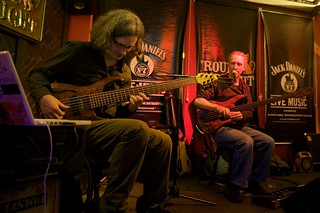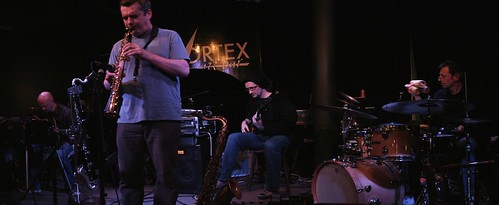I recently ran an ‘ask me anything‘ thread on my blog – the questions and the answers were posted in the comments, and I had intended to reblog the answers at some point. The first of them to leap out at me was one that fits better here than on stevelawson.net – a question from a former student of mine, Sam Hallam, about improv. Here’s Sam’s question and my answer:
Sam Hallam:
I’m interested in your thoughts on improvisation, and teaching improvisation.
There’s an amusing irony that a large amount of improvisational music is taught within very strict boundaries. (i.e. Bebop tunes, Rhythm Changes, whatever) and that as a beginning improviser you will mostly be able to practice with other musicians only in those idioms.
How and when is it then possible to break away from improvising in what can sometimes be a outdated and dogmatic context to truly get at the heart of what improvisation is and focus on spontaneity and MUSIC in general… rather than working on just ‘killing it’ over Oleo for the next 20 years?
Me:
Good Q, Sam,
I think the teaching of improvisation as ‘learning jazz’ has done a great disservice to the music of the world, as though jazz is the only tradition in which improv exists.
The learning of the jazz canon should, I think, be seen not particularly as ‘learning to improvise’ but primarily about ‘doing your homework’ – there’s a way of playing that kind of jazz that brings with it a specific set of learning – much of which is about a shared vernacular, rather than the wider improvisational goal of building your own vocabulary, not just melodically but harmonically and idiomatically as well…
Jazz – within that post-bop tradition – is a technically very demanding musical world. The amount of stuff you need to learn to get your instrument around in order to even have a reasonable chance of not looking like an idiot in a jam session is pretty huge. The point at which you can innovate on top of it is further along that path.
For people who are passionate about that particular idiomatic path, it makes a whole lot of sense. For those of us who have little interest in playing bop/swing/post-bop etc. the ‘tyranny of the Omnibook’ has been in many cases a real hindrance to forming a unique, personal voice and perspective on our chosen instrument.
So I tend to look at improvisation as primarily an orientation towards music making. One in which the decision-making process, moment to moment, is mine. Collectively, our focuses on making the best music we can as it unfolds, making decisions based on all the things we’re aware of. We can dip in and out of idioms if we wish (assuming there are no other stylistic of philosophical constraints placed on the world – for example, if you were playing within the ‘non-idiomatic’ tradition of the london improv orchestra) and we can contribute our voice to the building of something musically ‘good’.
 The way the improvisation sits alongside various musical traditions strikes me as another layer on top of that orientation towards music – most forms of jazz bring with them a huge weight of expectation regarding the parameters within which your improvisations are going to happen, specific kinds of phrasing, rhythm, scales, techniques… there’s a very macho ‘dues-paying’ culture that requires you to ‘prove what you can do’ before you’re allowed to subvert those traditions.
The way the improvisation sits alongside various musical traditions strikes me as another layer on top of that orientation towards music – most forms of jazz bring with them a huge weight of expectation regarding the parameters within which your improvisations are going to happen, specific kinds of phrasing, rhythm, scales, techniques… there’s a very macho ‘dues-paying’ culture that requires you to ‘prove what you can do’ before you’re allowed to subvert those traditions.
Which is clearly, in artistic terms, utter bollocks. It makes some sense as a cultural manifestation of a preservationist instinct (not necessarily a bad thing), or for someone who sees the integrity of the tradition as paramount to the context for their ongoing work, but as a way of limiting the freedom of expression of any particular artist, it’s meaningless.
So what’s important here? Naming the processes, coming up with a sensible understanding of what’s actually going on, of a kind of ‘hierarchy of process’ for how the concept of improvisation interfaces with our loftier artistic goals, and making personal decisions about the degree to which that specific jazz vernacular is important to us being able to say what we want to say on our instrument (and also – significantly – to our ability to get work on our instrument within our chosen field – my lack of facility in bop/post-bop contexts has no doubt lost me work, though it’s lack of evidence in my solo work has more than made up for the £345 I may have lost in the last 20 years by not being willing to plough that particular furrow ![]() )
)
What we practice is what comes out when we make music – you can fairly easily spot players who dedicated years of their life to playing bebop-and-its-descendent-forms – they have a relationship with dexterity and with that harmonic world that is pretty tricky to shake off. That’s no bad thing at all, if that’s the music they want to make (I find it really hard to shake off the harmonic world of the new wave and progressive music I grew up with too!) but it’s never advisable to be too closely wedded to music you’re not passionate about…
Sam Hallam:
I suppose the next question I have to ask as a follow up. Is how do you curate your own personal environment so you can work towards your own goals.
If one’s improvisational influences do not fall within the environment you are in, what is the best way to work towards that?
Example, here in Little Rock, AR. There is a small but active jazz scene, but is focused on what I talked about it before, playing the music of Sonny Rollins, Charlie Paker, and whatever other standards. If the music you want to project is related to that scene but not part of it. How do you work an acheving your own goals parralell to existing within that scene (that you may or may not also enjoy and want to be apart of)
Sorry if I’m making absolutely zero sense, just some thoughts of mine…
(I realise now I didn’t answer Sam’s questions in his follow up in the original post – so I’ll tackle those here at a later date as part 2…)
